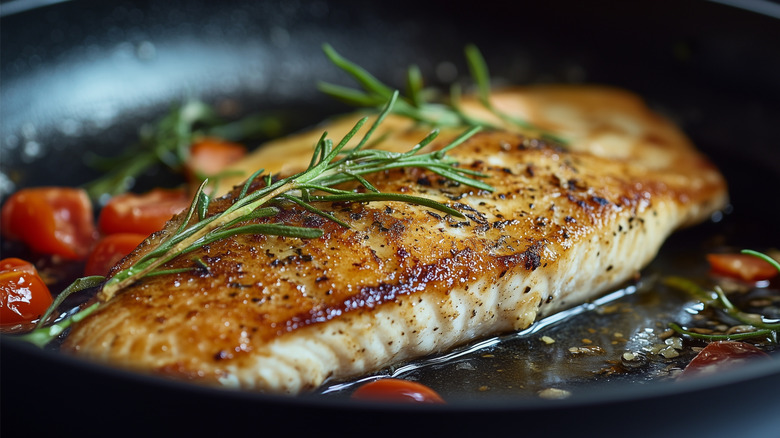Can You Freeze Cooked Fish?
Fish is remarkably healthy and flavorful, and there is no shortage of ways to prepare it. Plus, there are plenty of inexpensive fish that you can enjoy without breaking the bank. However, once fish is cooked, it will only keep for three to four days in the fridge, which can be a problem if you're making a lot. Fortunately, though, cooked fish can be frozen — with a caveat.
According to the USDA, you can store cooked fish in the freezer for up to three months, after which it may decrease in quality. However, this is assuming the fish is stored properly and protected from things like freezer burn, which occurs due to dehydration from exposure to dry air in a freezer. This is most likely to happen when food isn't properly sealed, and it can completely change the texture and taste of cooked fish. The good news is this can be prevented by storing fish in a freezer-safe bag with as much air removed as possible. For more protection, you can wrap your bagged cooked fish in butcher paper, plastic wrap, or tin foil before putting it in the bag. Another smart storage solution to prevent freezer burnt food is to vacuum seal your leftover fish, which will do the best job of removing air to prevent moisture loss.
So, freezing cooked fish is totally an option, but is it actually recommended? Yes, just note that one of the biggest issues with freezing fish comes with reheating it. Fish is very easy to overcook, and if you're reheating it from the freezer, you're essentially going to be cooking it twice. This can lead to a very dry and unappetizing meal the second time around. That said, there are some ways to avoid this problem.
The best ways to use frozen cooked fish
Reheating cooked fish is tricky, as it can quickly overcook and become dry, tough, and pretty dang unappetizing. Don't let this turn you off from freezing cooked fish, though, because it is possible to reheat cooked frozen fish and preserve it. If you're reheating a frozen fillet, let it thaw in the fridge completely before cooking it. If you don't, it will have to cook for longer to heat through, increasing the risk of it drying out. When reheating, wrap the fish in foil to keep the juices in, and if it's still a bit dry, you can add a drizzle of oil or warmed butter. Alternatively, a marinade can add some extra moisture while cooking, too.
Another great way to prevent ruining a meal with frozen cooked fish that's lost its moisture is by using it in a different way. For example, reheated salmon can be used to make creamy lohikeitto soup or delicious salmon burgers. Even types of white fish like cod, haddock, and halibut can be used in a variety of stews, soups, or curries. Fish can also be thawed, flaked, and briefly heated in a skillet with some seasoning and lime to make killer fish tacos.
Alternatively, frozen cooked fish doesn't necessarily have to be reheated. If you have tuna, you could turn it into tuna salad, while salmon can be blended into a rich and savory spread. If you need to disguise the fishy taste, you can add a squeeze of lemon, a bit of vinegar, or some tomato. Any variety of white fish can also be turned into a spread, and they will provide a mild flavor you can really amp up with ingredients like fresh herbs, scallions, and capers.

